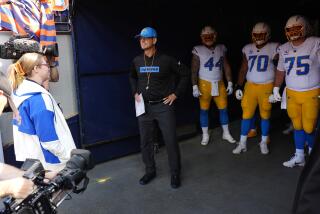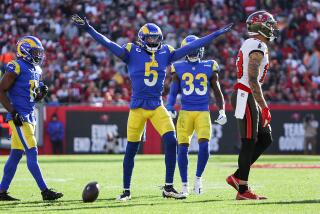A Buccaneer Patch Job
- Share via
The coach who once held the NFL in the palms of his hands now has those hands gripped tightly around the steering wheel of the Tampa Bay Buccaneers, doing what he can to regain control of a franchise that has drifted far off course.
Jon Gruden, two seasons removed from pro football’s mountaintop, is determined to resurrect a team that has gone 12-20 since throttling the Oakland Raiders in Super Bowl XXXVII on Jan. 26, 2003.
“We’re getting through the clouds now,” Gruden said. “I see the sunshine out. But it’s hard when you don’t have the players and the salary cap is knocking on the door every day.”
As for the knocking, that has dropped off in a big way. The scowl that launched a thousand ad campaigns -- the one that earned Gruden the nickname Chucky, after the horror-movie doll -- is now a justifiable grimace. The Buccaneers have the lowest two-season winning percentage of any team coming off a Super Bowl victory.
Two years ago, Gruden arguably was the most marketable personality in the nation’s No. 1 league. He wrote a bestselling book, “Do You Love Football? Winning with Heart, Passion and Not Much Sleep,” was a guest on “Late Night with David Letterman,” was the subject of a Playboy interview, rang the opening bell on Wall Street, had lucrative endorsement deals with Marriott and Florida Citrus Growers, and commanded a $50,000 fee on the motivational speakers’ circuit.
But as the Buccaneers faded, so did demand for their coach. The ads on national TV appeared less frequently, Gruden’s sneer less prevalently. He still has a large following, of course, but other NFL players and coaches -- among them Tom Brady, Donovan McNabb and Bill Parcells -- are at least as popular, if not more.
“That’s what happens if you don’t have success,” Gruden said. “You have to roll with it. I understand that.”
His agent, Bob LaMonte, who represents eight NFL head coaches, says Gruden, 42, remains among the top five most marketable personalities in the league, even if demand for him has cooled a bit.
“There is no death of Chucky,” LaMonte said. “Chucky’s too young, too dynamic, too good to die. Chucky isn’t a 70-year-old man riding off into the sunset.”
This season, the Buccaneers only wish they could play a game after dark. For the first time since 1989, the Ray Perkins era, Tampa Bay does not have a prime-time game.
Attendance at training camp reportedly is down about 40% and, although the Buccaneers are still the biggest thing in town, tickets to their games are much easier to come by than they were a few years ago.
Marketing expert Steve Rosner, who has represented dozens of top athletes, says it’s often easier for a player to maintain his marketability than it is for a coach.
“When you’re a coach, it’s a little bit more of ‘What have you done for me lately?’ ” said Rosner, founder of 16W Marketing in Rutherford, N.J. “There are a couple guys who have built up enough equity on the sidelines where they don’t necessarily need to win -- Bill Parcells, and to some degree Mike Ditka. But Jon won a Super Bowl pretty quickly, so I’m not sure he’s built up enough equity over those years to maintain the endorsement portfolio he might have had right after the Super Bowl.”
By all accounts, Gruden is far more interested in winning games than developing his endorsement portfolio. And it’s not as if his team was knocked around mercilessly last season. Even though they finished 5-11, the Buccaneers were in every game but one. They gained 700 yards more than their opponents and gave up only three more points than they scored. Among the factors that hurt them were the wild inconsistency of since-released kicker Martin Gramatica, pivotal interceptions of Brian Griese’s passes, and injuries to some significant players.
Of the lousy kicking, Gruden said, “I don’t know if anybody wins a golf tournament who’s last on the tour in putting.”
Among the problems: The Buccaneers built their Super Bowl team around veteran players, many of them 30 or older, and didn’t do a good enough job developing youthful depth at those positions.
They also incurred a big salary-cap debt and, when they had to clear it by releasing those veterans, found themselves green at some key spots.
The franchise also paid a steep price to the Raiders to get Gruden out of the last year of his contract in Oakland. The Buccaneers gave up $8 million in cash, along with two first-round draft picks and two second-rounders. That, of course, affected their ability to build, as did their necessary salary-cap purge.
Said Gruden: “When your theme song is, ‘Hey, We Cleared 30 Million on the Cap!’ that to me is not a real exciting fight song.”
Still, it appears that the Buccaneers have made some significant moves, although they are picked by many to finish last in the difficult NFC South.
Armed with a full slate of draft picks for the first time in years, they used their top selection on Auburn running back Carnell “Cadillac” Williams, who figures to make an immediate impact. And second-year receiver Michael Clayton last season set franchise rookie records with 80 catches for 1,198 yards and eight touchdowns.
It can only help Gruden and Bruce Allen, the general manager he brought from Oakland, that time has passed since the widely criticized release of some of the most popular players, notably safety John Lynch, a fan favorite.
Gruden argues that a lot of bad personnel decisions were made long before he arrived. And there was palpable tension between him and former general manager Rich McKay, now the top executive with the Atlanta Falcons.
“Just look back at the last 10 years,” Gruden said. “When you can’t go get players, you don’t have a lot of young players in the house, and there’s a bad cap situation, that’s not good.”
How long the rebuilding process will take is unclear. Speculation around the Buccaneers is that if Gruden ultimately winds up leaving, it will be his decision and not the club’s.
After all, less than three years ago a giddy Malcolm Glazer, owner of the team, stood on the Super Bowl platform in San Diego and gushed, “Jon Gruden is from heaven!”
It’s just that the last two seasons have been from an entirely different place.
*
(BEGIN TEXT OF INFOBOX)
Not so Super
Five of the eight current NFL coaches who have won Super Bowls missed the playoffs last season and four had losing records. A look:
*--* Coach, Team Last season Bill Belichick, New England Won Super Bowl Jon Gruden, Tampa Bay 5-11 Brian Billick, Baltimore 9-7 Dick Vermeil, Kansas City 7-9 Mike Shanahan, Denver 10-6, L in WC Mike Holmgren, Seattle 9-7, L in WC Bill Parcells, Dallas 6-10 Joe Gibbs, Washington 6-10
*--*
* Seasons these NFL coaches won their Super Bowls (teams in parentheses): Belichick, 2001, 2003 and 2004 (New England); Gruden, 2002 (Tampa Bay); Billick, 2000 (Baltimore); Vermeil, 1999 (St. Louis); Shanahan, 1997 and 1998 (Denver); Holmgren, 1996 (Green Bay); Parcells, 1986 and 1990 (N.Y. Giants); Gibbs, 1982, 1987 and 1991 (Washington).
First to much worse
The NFL’s worst two-season records after winning a Super Bowl (the season listed is the one in which the team won
the title):The Tampa Bay Buccaneers must finish at least 5-11 this season to avoid joining the 1991 Washington Redskins on top of the three-year list:
*--* SEA. TEAM REC. PCT. 2002 Tampa Bay 12-20 375 1991 Washington 13-19 406 1990 N.Y. Giants 14-18 438 1967 Green Bay 14-14 500 1995 Dallas 16-16 500
*--*
*--* SEA. TEAM REC. PCT. 1991 Washington 16-32 333 1970 Baltimore 19-23 452 1967 Green Bay 20-22 476 1968 N.Y. Jets 20-22 476 1990 N.Y. Giants 25-23 521
*--*
Source: Stats LLC
More to Read
Go beyond the scoreboard
Get the latest on L.A.'s teams in the daily Sports Report newsletter.
You may occasionally receive promotional content from the Los Angeles Times.











